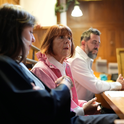My word, the French countryside is beautiful in June. I'd bought WG Sebald's latest book to read on the long car journey from Calais to Toulouse, but had no need of it: I looked out of the window for seven hours with hardly a moment's boredom. The autoroute was black and smooth all the way. There was not a scrap of litter on the hard shoulder and there were flowering shrubs in the central reservation. Our brand-new MPV had air-conditioning and a CD player on which we played Frank Sinatra's greatest hits. It was surprising how well Frank's rendering of That's Life complemented the passing fields of Picardie at sunrise. After Paris there was hardly any traffic.
Just outside Toulouse, we stopped at a restaurant and the six of us ate a five course lunch on a terrace overlooking a wide, slow-moving river which must have been the Garonne. Even the butter for the bread rolls tasted nicer than the stuff at home. The waitress was a little defensive at first-there had been some unpleasantness involving England supporters the night before-but Melvyn won her over by falling over backwards in his chair and cutting his head on the vacant table behind. When the food stopped coming we had a large Calvados each, paid up, then drove into the town centre and parked under an acacia tree beside a van full of CRS riot police.
None of us wore the replica England shirt or Sun bowler hat or had a cross of St George painted across his face. We figured that if we didn't make it obvious that we were England supporters, it would be easier to infiltrate the road-blocks, the riot police cordons and the Holiday Inn, where we had arranged to meet friends. It was a good move. The doorman at the hotel admitted us without demur from the drunken pandemonium of the town square to the dove-grey carpeted calm of the lobby. Making straight for the bar, we plunged headlong into a convivial crowd of media people, businessmen, Labour MPs and London ticket touts.
Television soccer pundit Andy Gray and commentator Alan Parry were at the bar, sipping lagers. Tom Pendry MP was wandering about in a suit. "Wotcha, Tom," we said, and he seemed pleased to be recognised.
The London ticket touts were all haircuts, palm-sized mobile phones and Ralph Lauren polo shirts. I hadn't a ticket for the game yet, so when I happened to find myself alone in the gents with a tout I decided to broach the subject with him.
"How much have you got to spend, chief?" he said.
"Hundred, hundred and fifty," I said nonchalantly.
"Do me a favour, mate," he said, going bandy-legged to do up his fly button.
Back out in the bar, the other match in England's group, Colombia v Tunisia, was about to kick off on the television in the corner. We gathered round the set, clutching our drinks. Andy Gray did the commentary. "See that keeper?" he said, pointing to the Tunisian goalkeeper as he organised the wall in readiness for a direct free kick just outside the box. "He's useless."
Five seconds later, this keeper pulled off one of the saves of the tournament: a spectacular one-handed arched-backed fingertip save which prevented the ball from dipping under the crossbar.
"Yeah, useless, Andy," we hooted. "Any jobs going at Sky?"
From time to time, opportunist non-resident boozers (besides us) managed to infiltrate the cordon sanitaire at the door and find their way to the bar. Among them was an unshaven young man in a bright green shirt and square glasses. Ronnie had been in Marseilles. For two days afterwards a British tabloid had printed a photograph of him burning the national flag of Tunisia in the street, under the caption: "Can you name this man?" Another newspaper had published a photograph of him giving a Nazi salute.
On both counts, Ronnie said, he had been grossly misrepresented and he was very disillusioned about it. The burning of the Tunisian flag was simply a patriotic response to an earlier burning of the Union Jack by Tunisians, who started all the trouble in the first place. As for the Nazi salute, said Ron: a journalist had taken a picture of him chanting with both arms raised, and the picture desk had snipped off an arm to make it appear that he was a fascist. "I'm not even a racist," he said indignantly. "Well, not really."
After Ronnie we bumped into Tracey from Billericay. She was 19 and had flown to Toulouse on the spur of the moment. She was wearing a Union Jack crop-top, faded denim hot-pants and a vertiginous pair of white high heel shoes. She was alone and hobbling.
"Those shoes don't look very comfortable," I said.
"They're bleeding killing me," she said. "I'll be OK though as long as me blisters don't burst."
During the half-time interval of the Columbia v Tunisia match, we were shown an elderly French soccer pundit, with an unbelievably raddled-looking face, who picked his nose and ate it, quite openly, twice, while speaking to the camera. "If my Dad sees me pickin' me nose," said Tray, "he says I'll have to put on a pair of his old boxing gloves."
Now the 20,000-strong crusader army camped in the town square was gathering together what it had left of its wits and moving off towards the stadium, about a mile away. As it went it sang "With St George in my heart keep me English" to a tune that I hadn't heard since Sunday school. We could hear the singing clearly, and when we looked towards the glass doors in the lobby we saw the blood-red crosses of St George going past in the sunshine. Without a word we drained our glasses and went outside. I was flying.











